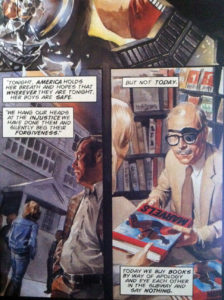What if superheroes were real? It’s crossed most of our minds – comics readers or not. Our world may not have alien invaders, but it needs saving all the same. There’s plenty for superheroes to stand against and fight, but I don’t know if we’re ready to accept them. I’d like to think so, that we’re beyond basic prejudices, that we would react better than the humans in Marvels but we’re probably not much different.
Many of us are fair weather fans; we root for the winning team and forget about them next season when they lose. Though there are a lot of loyal ones too, and I think our temporary adulation would extend to superheroes. We’d be thankful when they save the day, and we’d treat them as outcasts during peaceful times. They’d be like celebrities, but ultimately their abilities would frighten us. The differences between them and us would be too great. And the first time they left behind a trail of expensive destruction even if they were saving the planets? Forget about it.
Tony Stark can write checks all day to cover Iron Man’s costs and probably The Avengers too (though maybe not the estimated $160 billion worth of damage they inflicted on Manhattan in the movie). Reed Richards has a little money to spare. But for the most part? Rebuilding after a battle would have to come out of taxpayer’s money. I’d think FEMA would be responsible for some of it; a visit from someone like Galactus would surely count as a national emergency. But heroes can leave behind rubble in the course of everyday activities like chasing robbers or transforming into green rage monsters.
I can’t even imagine the arguments we’d have about who would foot the bill. We’d have to vote, and the campaigning process would be long, the political attack ads would be horrible. As much as I’d love to have a Superman in our world to make it a better place, we’re not ready.
Phil Sheldon spends a lifetime among heroes in Kurt Busiek and Alex Ross’ Marvels and witnesses and experiences the roller coaster of appreciation, disdain, and acceptance of the more-than-human beings. He sees the phenomenon begin with the first Human Torch and watches in awe as the ranks grow until heroes (or as he calls them, Marvels) and their actions are part of day to day life.
They are feared, they are revered and treated like deities, they are hated, they are loved, they are welcome, they are excluded – it all depends on the day and the whim of the humans. They barely know what to do with superheroes, but they don’t even give the X-Men a chance. No, the mutants are set apart from the rest because regular humans were scared of them. They were born with different genetic make-up and that made even smart people feel threatened. That leads to lashing out in fear.
It’s hard to watch the cycle because it feels so much like what would happen in modern times.
We get an up close look, too. Phil Sheldon builds his photography and journalism career around the superheroes. He capitalizes on their popularity and publishes a coffee table book featuring their images at just the right time – when the general public is going through a “celebrate the heroes” phase. Though he makes many moves like that for the sake of his career (and who can blame him), I think he’s also fascinated.
He gets to see them and their heroics with his own eyes instead of what’s filtered through the evening news. He’s one of the people telling the story and showing the public what happened and even though he goes through the periods of doubt, disdain, and reverence, you get the impression that he delivers his work without bias. That’s good for journalism, but there’s a line.
Phil clearly sees how horrible we’re treating the Marvels and makes sarcastic remarks about the unfairness to everyone, but he doesn’t know how to shake people out of it. His second book was intended to do just that; it would show what the Marvels did for all of humanity. Unfortunately, Phil lost heart. He saw they couldn’t save everyone, and he was tired of tangling his life with those of heroes. It was as good a time to retire as any, but the world needed his book. It could have opened a few pairs of eyes, and if you have the chance to do that, you shouldn’t walk away.


If you want to know what happens after the battles have torn up the landscape, read Dwayne McDuffie’s Damage Control.